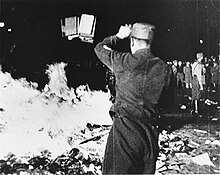Benutzer:Phoenyx 5/Transgeschlechtliche Personen im NS-Staat

Transgeschlechtliche Personen im NS-Staat wurden strafrechtlich verfolgt, von der Gesellschaft ausgeschlossen, zur Detransition gezwungen, und in Konzentrationslagern eingesperrt und getötet. Auch mit den potentiell abmildernden Faktoren, wie z.B. "Arisches" Aussehen oder vermeintliche Heterosexualität waren transgeschlechtliche Personen weitgehend rechtlich nicht anerkannt von dem NS-Staat.
Under the German Empire (from 1871 to 1918) and Weimar Germany (from 1918 to 1933), laws such as Paragraph 183 existed which were used to prosecute transgender individuals; however, these laws were inconsistently enforced, often leaving transgender people vulnerable to the arbitrary decisions of individual police officers. In 1908, thanks to the advocacy of Magnus Hirschfeld, Germany instituted the ability for transgender people to obtain transvestite passes, which shielded them from legal consequences for being publicly transgender. From the end of World War I until 1933, transgender people enjoyed previously unprecedented freedoms and rights. Large leaps were made in transgender medicine through the Institute for Sexual Science, and transgender culture flourished in Berlin.
However, following the Prussian coup d'état in 1932 and the Nazi seizure of power in 1933, transgender movements, gathering places and institutions, such as the first homosexual movement, the Eldorado nightclubs, and the Institute for Sexual Science were dissolved, often by force. Both trans men and trans women were targeted under renewed enforcement of Paragraphs 175 and 183, and their transvestite passes were revoked or simply ignored. Books and texts relating to transgender experiences or medicine were destroyed as "un-German".
Transgender people were imprisoned and murdered in concentration camps, though the exact number killed is unknown. According to historian Laurie Marhoefer, "The Nazi state reserved its worst violence for trans women." According to the Museum of Jewish Heritage, the German government "brutally targeted the trans community, deporting many trans people to concentration camps and wiping out vibrant community structures."
Terminologie
[Bearbeiten | Quelltext bearbeiten]Der Begriff transgender, an English-German cognate, was not coined until 1965 and not widely accepted as a universal term until the 1990s.[1] The German word transsexualismus (lit. 'transsexualism', adapted into English as the term transsexual) was first coined in 1923 by Magnus Hirschfeld, but would not enter widespread use until 30 years later with the work of Harry Benjamin.[2][3] Before these terms, in German the term transvestit (lit. 'transvestite', masculine) was used to refer to transfeminine individuals, and the term transvestitin (lit. 'transvestite', feminine) was used to refer to transmasculine individuals.[4] In part because no alternative term was widespread, most Western transgender people of this time period self-identified as "transvestites".[6][7] Modern literature on the subject largely uses the term "transgender" to refer to these individuals as a more accurate description of their gender identity.[8][7] According to Joanne Meyerowitz and other scholars of the topic, it is difficult if not outright impossible to know what pronouns transgender or transvestite people in these times would have preferred, and as such it is common practice to simply use the pronouns which align with what is known of their gender presentation (i.e., he/him for individuals who present masculine, and she/her for individuals who present feminine).[4][9] [[Kategorie:Nationalsozialismus]] [[Kategorie:Transgeschlechtlichkeit]]